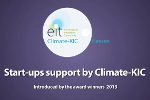Reduced Footprints of Monumental Structures, Landscapes & Buildings (ReFoMo)
Challenge Platform: Transforming the Built Environment
Project Start Date: 07/2013
Lead partner: Province of Utrecht, NL
Project type: Pathfinder – Explores relevant climate arenas to identify and prioritise innovation opportunities
Project lead: Provincie Utrecht, Lodewijk le Grand
Partners
This project involves 7 partners in 4 European countries:
- Province of Utrecht, The Netherlands
- Arcadis Netherlands BV, The Netherlands
- Utrecht University – Utrecht Sustainability Unit, The Netherlands (Climate-KIC Core Partner)
- NEGOS, Hungary
- The centre for applied research - Buildings and Construction (CIRI), University of Bologna (UNIBO), Italy
- AIDICO Instituto Tecnológico de la Construcción, (Technological Institute of Construction), Spain
- Utrecht University – Energie, Milieu & Energiewissenschaften, The Netherlands (Climate-KIC Core Partner)
Concept
Due to the inefficient energy consumption of heritage buildings’, they have a significant impact on climate change. The Reduced Footprints of Monumental Structures, Landscapes & Buildings (ReFoMo) project aims to explore the potential and demand for restoration projects which would improve the energy efficiency of these buildings. Energy efficiency is desirable for tenants and owners of heritage buildings and so there is scope to develop a market providing such a service.
The climate change issue
Heritage buildings consist of listed buildings built before 1945 and unlisted buildings with monumental, historic or iconic value. Buildings built before 1945 have a huge energy demand and contribute a significant amount to carbon emissions. Buildings in general account for 40% of total energy consumption in the EU. Climate-proof refurbishment of only half of Europe’s heritage buildings (5% of the total buildings stock) with an average of factor 4 reduction will result in a reduction of 5.6% of the total energy demand of buildings (which represents 2.25% of the total energy consumption). But due to the lack of incentive and relevant information there is currently no market for the climate-proof refurbishment of heritage buildings. Compared with modern buildings, heritage buildings have more complex thermal behaviour due to their design and structure. Consequently, many factors limit the improvement of the energy efficiency of heritage buildings and fear of irreversible damage makes testing and retrofitting difficult to carry out. Their exemption from the EU Energy Performance of Building Directive also limits incentives for retrofitting.
The Project Solution
ReFoMo’s main objective is to work with stakeholders in heritage and conservation organisations to explore the potential to retrofit heritage buildings and thus increase their sustainability. By doing this, it aims to widen the demand for refurbishment of heritage buildings and to establish a new market where sustainable solutions are available to the owners and tenants.
The main product of ReFoMo will be a report providing guidelines for sustainable renovation of historical buildings and a market analysis. A network of European partners will be used to deliver solutions drawing on the analysis of three case studies:
• Historic fortifications and fortresses (Utrecht, Netherlands)
• Historic public buildings/iconic buildings (Bologna, Faculty of Engineering University)
• Industrial Heritage (Budapest, Óbuda Gasworks)
The results of these case studies, each representing different types of buildings, climates and usages, will be used to assess the potential market services and obstacles. Even though each heritage building is unique and will need specifically tailored solutions, the findings from these case studies will help provide a suitable framework for improving the efficiency of other buildings.
The role of Climate-KIC
Climate-KIC’s network has played an essential role in finding partners for the project. These partners have provided inspiration from other regions and institutions across Europe. As a thought leader for heritage buildings ReFoMo is mainly concerned with policy making and mitigation. Scientific input from partners has helped to focus on the innovative aspects of the project, providing a broader perspective.



